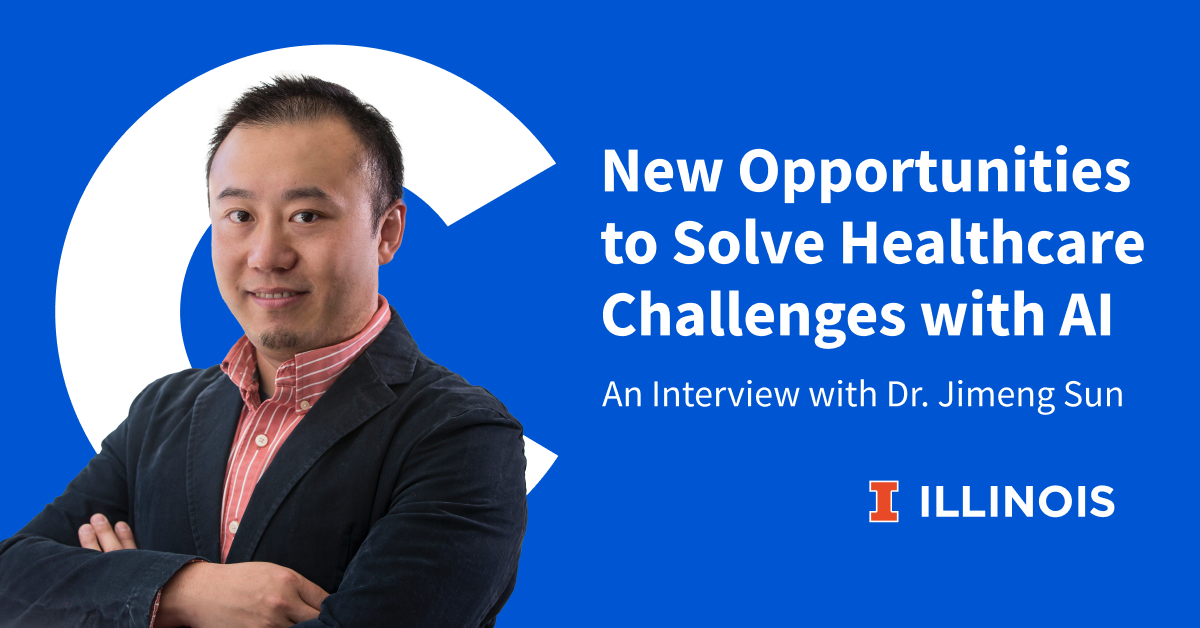
An Interview with Dr. Jimeng Sun about the new Deep Learning for Healthcare Specialization on Coursera
Artificial intelligence and deep learning are being used to solve important challenges in the field of healthcare, and these innovations are being made possible through the groundbreaking efforts of visionary practitioners who work at the intersection of health and computer science.
With the launch of the new Deep Learning for Healthcare Specialization on Coursera, anyone interested in solving real-world healthcare problems can now explore how deep learning methods can be applied to these pressing global issues.
Dr. Jimeng Sun, the Health Innovation Professor at the University of Illinois Urbana-Champaign, leads the new Specialization.
With his dual expertise in computer science and healthcare, Dr. Sun is a highly influential voice at the intersection of technology and healthcare. He was recently recognized as one of the Top 100 AI Leaders in Drug Discovery and Advanced Healthcare by Deep Knowledge Analytics. Through his roles as both researcher and academic, he is not only driving innovation in the field but is also helping to train new generations of talent.
We spoke with Dr. Sun recently about the new Deep Learning for Healthcare Specialization.
Professor Sun, how does your background in both industry and academia inform your interest in teaching Deep Learning for Healthcare on Coursera?
My previous work in academia was at the College of Computing at the Georgia Institute of Technology. Prior to that, I was on the industry side through my work at IBM.
I have been teaching big data for healthcare for years, and I find that students have always been interested in knowing more about deep learning and its real-world applications. My PhD students are able to do a lot of research and publish their work on the topic of deep learning for healthcare. I think I’m ready to offer this topic to a broader student population.
What background does a learner need to succeed in the Deep Learning for Healthcare Specialization?
This is designed to be an introductory graduate-level Specialization. Students will need a strong Python programming background, but while a machine learning background is recommended, it is not essential. And, students do not need a background in healthcare.
Previously, I have worked with students who are coming directly out of a bachelor’s program, and I have also worked with students who are CEOs of large medical record companies. This Specialization is designed for almost any learner around the world.
The goal here is to help students develop a basic understanding of deep learning and how they might apply it in their own careers.
What excites you about teaching deep learning on Coursera?
I have been providing my courses in an online format for years, but the potential scale and quality of coursework that I can provide via Coursera are particularly exciting. In the past, I’ve had to put a cap on the number of students in my classrooms because I couldn’t find enough teacher assistants, but this Specialization will give me access to broader student populations and relieve that pressure.
Plus, I am able to provide quality content in a condensed time frame through the online delivery of these Coursera modules, which will give both my students and myself more time to focus on our research and projects.
That’s a great segue to our next question—what are some of the key ways learners will benefit from this Specialization?
First off, the University of Illinois Urbana-Champaign has one of the leading graduate Computer Science programs in the country (most recently ranked 5th by US News and World Report in 2018). This is a large, very strong, integrated computer science program that provides ample engagement between students and professors.
Secondly, this Specialization is very method-oriented. In the past, other courses that have focused on AI and healthcare have had more of a “follow-the-problem” approach. But in this Specialization, we will be focusing on methodology. Students will first learn the deep learning method and then apply that method to a healthcare setting.
You mentioned other settings where these skills can be applied. Can you tell us more?
Because the deep learning methods I teach can be applied to any industry, students who have completed my Deep Learning for Healthcare courses have gone on to roles in finance, manufacturing, technology, and more—not just healthcare.
As someone who is leading the way when it comes to applying these transformative technologies to pressing global challenges like those we see in healthcare, is there a message you’d like to share with learners who are interested in building their careers in this field?
I would say that while much of deep learning and the processes within it are still in their early stages, the future of this work—and its real-world impact—is boundless.
~
We are so grateful to Dr. Sun for sharing his insights, and in addition to the many benefits associated with this new program that we discussed above, we also want to highlight the fact that when you enroll in the full University of Illinois’ Master of Computer Science program, the work you complete in this Specialization can be applied towards your degree.
The University of Illinois was the first North American university to offer a full degree on the Coursera platform, and we are thrilled to expand our offerings together to include Deep Learning for Healthcare as one of our newest specializations. Learn more and register today!
The post New Opportunities to Solve Healthcare Challenges with AI appeared first on Coursera Blog.
[ad_2]Article link

Free: 7-Days Trial from Coursera

